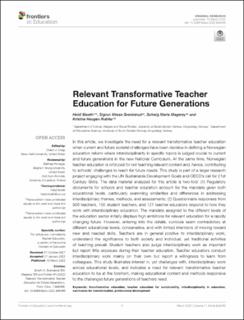| dc.contributor.author | Biseth, Heidi | |
| dc.contributor.author | Svenkerud, Sigrun | |
| dc.contributor.author | Magerøy, Solveig Maria | |
| dc.contributor.author | Rubilar, Kristine Haugen | |
| dc.date.accessioned | 2022-08-25T08:46:17Z | |
| dc.date.available | 2022-08-25T08:46:17Z | |
| dc.date.created | 2022-03-10T10:04:42Z | |
| dc.date.issued | 2022 | |
| dc.identifier.citation | Biseth, H., Svenkerud, S., Magerøy, S. M., & Rubilar, K. H. (2022). Relevant Transformative Teacher Education for Future Generations. Frontiers in Education, 7, Artikkel 806495. | en_US |
| dc.identifier.issn | 2504-284X | |
| dc.identifier.uri | https://hdl.handle.net/11250/3013467 | |
| dc.description.abstract | In this article, we investigate the need for a relevant transformative teacher education when current and future societal challenges have been decisive in defining a Norwegian education reform where interdisciplinarity in specific topics is judged crucial to current and future generations in the new National Curriculum. At the same time, Norwegian teacher education is criticized for not teaching relevant content and, hence, contributing to schools’ challenges to teach for future needs. This study is part of a larger research project engaging with the UN Sustainable Development Goals and OECD’s call for 21st Century Skills. The data material analyzed for this article is two-fold: (1) Regulatory documents for schools and teacher education account for the mandate given both educational levels, particularly examining similarities and differences in addressing interdisciplinary themes, methods, and assessments; (2) Questionnaire responses from 906 teachers, 155 student teachers, and 121 teacher educators respond to how they work with interdisciplinary education. The mandate assigned to the different levels of the education sector initially displays high ambitions for relevant education for a rapidly changing future. However, entering into the details, curricula seem contradictory at different educational levels, conservative, and with limited intentions of moving toward new and needed skills. Teachers are in general positive to interdisciplinary work, understand the significance to both society and individual, yet traditional activities of teaching prevail. Student teachers also judge interdisciplinary work as important but report little exposure during their teacher education. Teacher educators conduct interdisciplinary work mainly on their own but report a willingness to learn from colleagues. This study illustrates interest in, yet challenges with, interdisciplinary work across educational levels, and indicates a need for relevant transformative teacher education to be at the forefront, making educational content and methods responsive to the challenges future generations of teachers need. | en_US |
| dc.language.iso | eng | en_US |
| dc.relation.uri | https://doi.org/10.3389/feduc.2022.806495 | |
| dc.rights | Navngivelse 4.0 Internasjonal | * |
| dc.rights.uri | http://creativecommons.org/licenses/by/4.0/deed.no | * |
| dc.title | Relevant Transformative Teacher Education for Future Generations | en_US |
| dc.type | Peer reviewed | en_US |
| dc.type | Journal article | en_US |
| dc.description.version | publishedVersion | en_US |
| dc.rights.holder | © 2022 Biseth, Svenkerud, Magerøy and Rubilar. | en_US |
| dc.source.pagenumber | 12 | en_US |
| dc.source.volume | 7 | en_US |
| dc.source.journal | Frontiers in Education | en_US |
| dc.identifier.doi | https://doi.org/10.3389/feduc.2022.806495 | |
| dc.identifier.cristin | 2008709 | |
| dc.relation.project | Norges forskningsråd: 301180 | en_US |
| dc.source.articlenumber | 806495 | en_US |
| cristin.ispublished | true | |
| cristin.fulltext | original | |
| cristin.qualitycode | 1 | |

